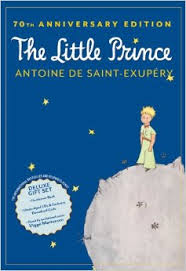In a recent post about Kindred Readers, I wrote about how profoundly important some books are to our senses of self, to our ability to know and make our worlds. I described characters or images or well-chosen words that “thrum the soul.” Last week I heard someone talk about a variation on this theme—the shudder we sometimes feels when we recognize the singular brilliance of a metaphor or a turn of phrase. I think the shudder is a physical manifestation of the thrum. For some readers, this feels like sharpened vision or a quickened heartbeat or tingling fingertips. For me, it’s the feeling that something inside me is suddenly sitting up.
I am lucky to live a life surrounded by books, and I frequently discover or rediscover passages that pluck at some raw and essential part of me, that thrum my soul, that make that something inside me shudder and sit up. Yesterday, it was the description in Middlemarch of “the roar on the other side of silence.” Today, it was the dedication to The Little Prince, which I quote here:
I ask the indulgence of the children who may read this book for dedicating it to a grown-up. I have a serious reason: he is the best friend I have in the world. I have another reason: this grown-up understands everything, even books about children. I have a third reason: he lives in France where he is hungry and cold. He needs cheering up. If all these reasons are not enough, I will dedicate the book to the child from whom this grown-up grew. All grown-ups were once children—although few of them remember it. And so I correct my dedication:
To Leon Werth, When he was a little boy.
I don’t know who Leon Werth is, and his need to be cheered up is ancient history. So, why do these words thrum my soul? There are two reasons. The first is that Antoine De Sainte Exupery describes a fundamental fact of the human condition: every adult was once a child. I like to remind myself of this when faced with a particularly and unpleasantly adult grown-up: the math teacher who made me feel slow, the cigar-smoking grumbler who shared my elevator, the surgeon adept at fixing joints but clumsy with conversation—all of these adults were children once. And knowing this, holding on to this truth makes these people more human, more sympathetic. It forges a bond.
The second reason is that the children adults once were are, in some ways, still on the scene. Sainte Exupery was able to dedicate his book to the little boy his friend used to be because the time “when he was a little boy” is a part of Leon Werth long years after he’s aged out of boyhood. The past isn’t left behind, this dedication claims. Instead, it remains with us always. The past is a part of us, like the layers of rock that are the surface of the earth. Someone said, “The past is a foreign country,” but I disagree. The past is our home. It is our bedrock.
The little girl I used to be isn’t gone. She persists in my mind and heart. Virginia when she was a little girl is with me in all that I do. She thinks with me and writes with me. She reads with me, too, and sometimes, I think she is the something inside me that sits up when a book thrums my soul.

